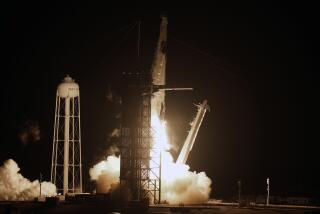U.S. Satellite Systems to Compete With Intelsat : * Communications: The Bush Administration will allow private companies to launch international communications services.
In a move that should help keep most international communications charges on a downward slope, the Bush Administration has ordered that private satellite systems be allowed to compete more fully with Intelsat, the multinational consortium that has long held a monopoly on most types of international satellite communications.
The decision calls for completely open competition in international satellite service by 1997. Until then, private network operators will still be limited to carrying television signals and providing private telephone lines for large corporate customers, but the new policy will allow them to connect these circuits to the public switched telephone network.
The biggest beneficiary of the new policy is Alpha Lyracom, previously known as Pan American Satellite, which has fought a long and lonely battle to end the Intelsat monopoly. Alpha Lyracom now has one satellite serving the United States, Latin America and Europe, and the company has ordered three more satellites for launch beginning in 1994.
“This has taken one big handicap off of us,” said Rene Anselmo, chairman of Alpha Lyracom, in reference to the new rules on private line connections to the public network. “And in five years, the monopoly ends, period.”
Several other companies, including Orion Network Systems of Rockville, Md., are also planning to launch international communications satellites.
Introducing competition into the international satellite business has been a contentious issue because of the unique status of the International Communications Satellite Organization, or Intelsat. The group was established by treaty decades ago to assure worldwide development of satellite communications, and all members of the organization--including the United States--agreed to prevent the establishment of competing satellite systems that would damage Intelsat.
While many U.S. officials have been eager to encourage greater competition in international communications, the State Department has been wary of diplomatic troubles that might result if the United States was seen to be undermining Intelsat.
The new policy, announced jointly on Wednesday by the U.S. Commerce Department and the Department of State, represents something of a compromise because it delays until 1997 the day when private operators can carry regular telephone traffic.
The Communications Satellite Corp. (Comsat), the U.S. representative to Intelsat, said it welcomed the decision.
Added competition, not only from private satellite operators but also from undersea fiber-optic cables, should assure that international communications prices continue to fall, observers say. But if Intelsat is weakened, prices could rise for service to remote countries that don’t attract interest from private operators.
More to Read
Inside the business of entertainment
The Wide Shot brings you news, analysis and insights on everything from streaming wars to production — and what it all means for the future.
You may occasionally receive promotional content from the Los Angeles Times.









